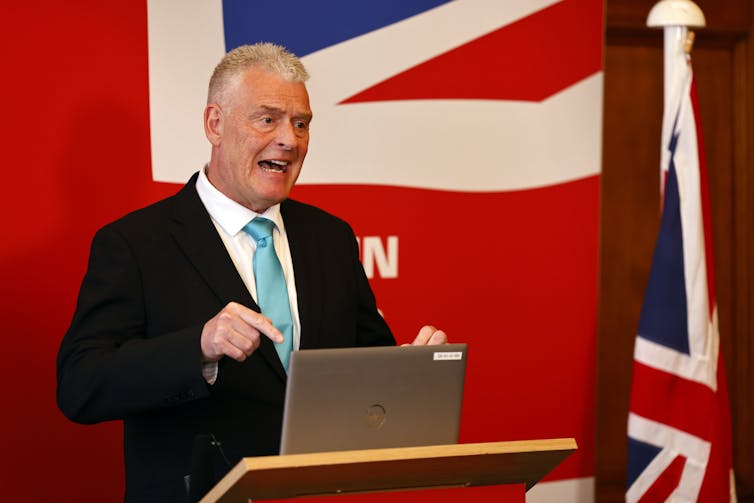Nigel Farage’s party, Reform UK, has a reputation for being chaotic and even unprofessional. But winning seats in the House of Commons would be a significant step on the road to becoming a political party akin to all the others.
Gaining even a small foothold in the House of Commons in the forthcoming election could give Reform the resources to transform into a serious contender – one able to mount an organised, professional campaign in 2029.
Reform has experienced an increase in support in the first weeks of the election campaign. A recent poll has shown that Reform could realistically win in seven constituencies.
And its vote share is almost certain to be far higher than the number of seats it wins. Even if it doesn’t make it to seven MPs, any presence in the House of Commons would unlock a stream of public funding for Reform of hundreds of thousands of pounds.
Reform is not the same slick machine as the more established parties competing in this election. It was still looking for candidates for many of the seats it wanted to contest when this election was called.
Many of those who did make the cut have turned out to be poor choices. One candidate had to stand down from the Reform ticket halfway through the election campaign after it emerged he had previously encouraged people to vote for the extreme-right British National Party. Another remains in the race despite calling Hitler “brilliant”. These are just two of the many people standing for Reform who are involved in one controversy or another.
Farage outsourced candidate vetting and is now seeking to blame the company in charge of the process for the state of his lineup. He is even threatening to sue.

Want more election coverage from The Conversation’s academic experts? Over the coming weeks, we’ll bring you informed analysis of developments in the campaign and we’ll fact check the claims being made. Sign up for our new, weekly election newsletter, delivered every Friday throughout the campaign and beyond.
A lack of professionalism is also demonstrated through some of the wild claims made in the party’s election manifesto, with economists questioning the maths on their £140 billion of election pledges. Farage’s disastrous interview on Good Morning Britain on June 18 showed that he perhaps does not have the staff needed to help him prepare for media appearances where he will be expected to defend his policy proposals.
Short money and the long road to viability
It’s no surprise that Reform UK is lacking in a professional staff support structure to underpin its election campaign. After all, as a relatively new party with only one MP (who defected from the Tories rather than being elected on a Reform ticket), it is dwarfed financially by the larger parties.
Donations registered with the Electoral Commission show that Reform has received only seven donations of more than £500 since the start of 2023. This compares with over 1,400 such donations made to the Conservative party and 854 to Labour.
Reform is in many ways more of a limited company than a party. Its most recent annual accounts show an income of £692,000 – a figure that pales in comparison to the £30 million brought in by the Conservative party and the £47 million by Labour.
Reform has had to rely on donations from former leader Richard Tice in order to make ends meet over the past few years. It is, in many ways, an amateur operation, regardless of Farage’s experience in forming and leading parties.
One of the most important ways small parties such as Reform UK can professionalise is to gain a foothold in the House of Commons. Once a party crosses this electoral threshold it is forced to think about how to put itself forward as an opposition party.
Crucially, Reform UK has not had access to any public funding to support its role as an opposition party. Assuming that it does return at least one MP at this election, however, it will become eligible for public funding.

If Reform returns between one and five MPs the overall payment of this funding (known as short money) ranges between £118,000 and £354,000. However, if a party returns six or more MPs this potential maximum disappears and parties receive just over £21,000 for each seat they won, plus another £42 for every 200 votes gained.
It is this latter calculation that could lead to Reform UK suddenly having the funds to professionalise itself quite rapidly. The Green party, with just one MP, has used its short money to contribute to the salaries of six staff while the SNP has employed 18.
These are the staff who will work hard to prepare the party’s MPs for big events in the House of Commons such as prime minister’s questions and responses to statements such as the budget, and ensure that they are well equipped to hold the new government to account. It’s this sort of activity that helps voters see small parties as ones which have the potential to govern.
This is why Farage will be looking at the 2029 election to make a bigger impact. His claim that he will be the real “leader of the opposition” next month suggests Reform UK will be pushing for greater recognition in light of its expected electoral performance, even if it does return only a handful of MPs.
Should the party gain more votes than the Conservatives, who are expected to go into the role of official opposition, there will certainly be pressure on the House of Commons Speaker – and others – to accede to Reform’s demands for time to speak and ask questions on the floor of the House. This, too, will help to give the impression that it is a potential party of government, rather than a minor party on the fringes.

